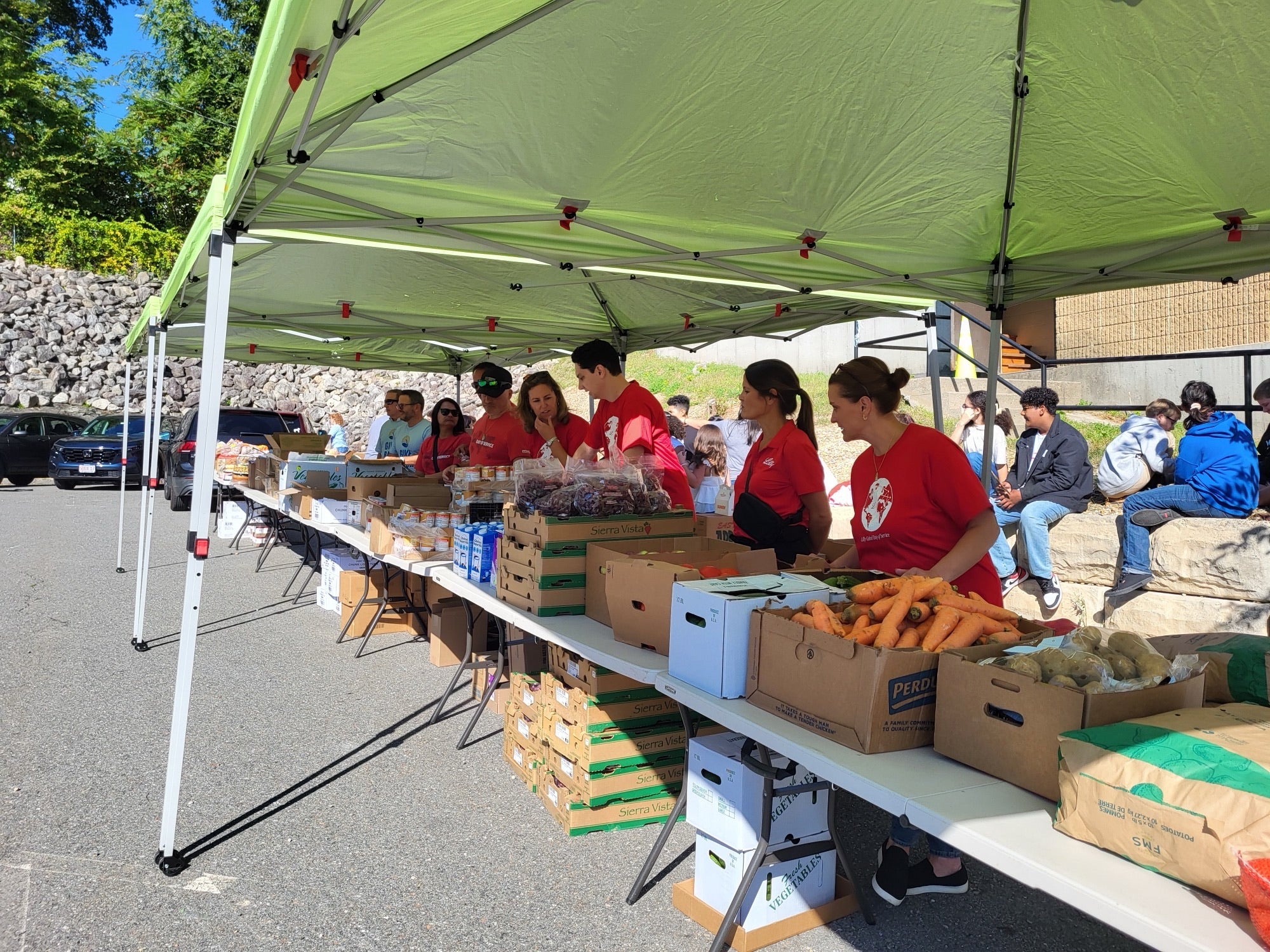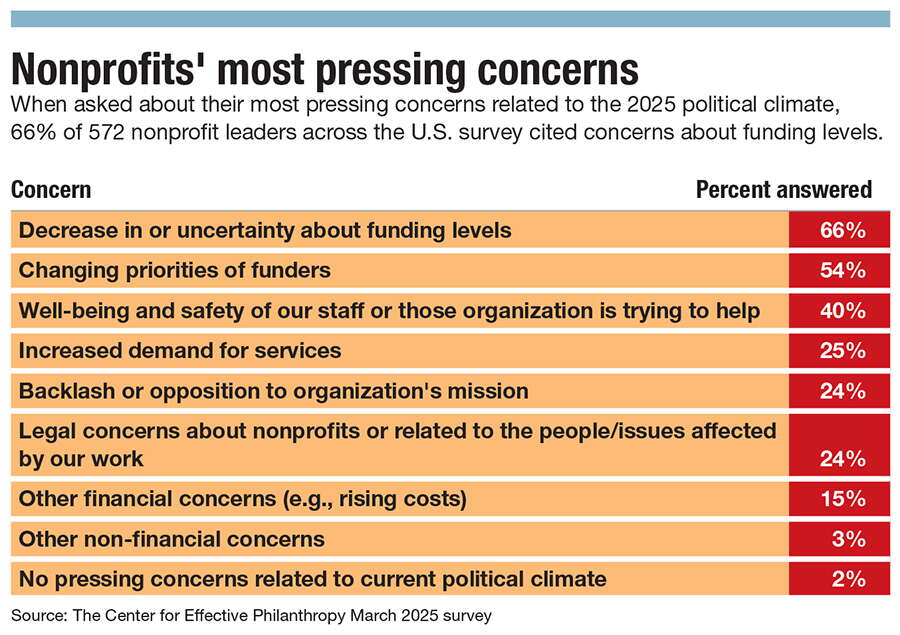
Preparing for disaster: With nonprofits teetering following federal cuts, the United Way has set aside $500K for the next crisis
 Photo | Courtesy of United Way of Central Massachusetts
United Way of Central Massachusetts held its annual Day of Action on Sept. 12, as area nonprofits deal with the economic challenges created by federal cuts.
Photo | Courtesy of United Way of Central Massachusetts
United Way of Central Massachusetts held its annual Day of Action on Sept. 12, as area nonprofits deal with the economic challenges created by federal cuts.
The inauguration of President Donald Trump in January has forced local nonprofits into a period of deep reflection on their own operations, as both proposed and realized slashes to federal spending on programs designed to help low-income residents are creating havoc on their budgets.
The cuts are being done in an effort to target programs the Trump Administration argues poison the minds of Americans with cultural Marxism, according to a May fact sheet released by the White House outlining cuts being made, which include preschool development grants and the Minority Business Development Agency. Trump’s fiscal 2026 budget proposal calls for the elimination of $770 million in Community Services Block Grants, programs which seek to tackle poverty and revitalize low-income communities, and the Big Beautiful Bill Act passed in July cuts $186 billion from the Supplemental Nutrition Assistance Program through 2034.
“One of our partners is the Worcester County Food Bank. They're part of our workforce development program,” said Ronald Waddell executive director and co-founder of Worcester nonprofit Legendary Legacies. “We have heard directly from them, with the looming suspension of SNAP, there's just not even enough food here to support those that are experiencing food insecurity. This puts additional stress on your workforce to provide the same amount, if not more services, with less resources, which is a recipe for burnout.”
Realizing all these federal cuts will impede nonprofits’ ability to respond in time of crisis, the United Way of Central Massachusetts launched the United Response Fund in August. The fund, started with a balance of $500,000, aims to support the organization’s four impact pillars of youth opportunities, financial security, healthy community, and community resilience. Its purpose is to support nonprofits doing work in times of crisis, with funding to be issued on an as-needed basis when the time arises.

“There is so much happening with executive orders, rescinding of orders, reductions, cuts, and budgets,” said Tim Garvin, president & CEO of the UWCM. “We within the United Way and other United Ways began to look at what were the essentials of life. Working with our board of directors, our staff, and our agency partners, we began to say, ‘What can we do to put something together, a fiscal safety net for the next disaster, emergency, or crisis?’”
The United Response Fund mirrors other UWCM efforts in helping the community recover, including the 2022 roof collapse at an apartment building on Worcester’s Mill Street to helping Puerto Rican families impacted by Hurricane Maria in 2017. During the first Trump Administration, UWCM partnered with the Greater Worcester Community Foundation and the City of Worcester in 2020 to provide $10 million in support for local nonprofits in the initial phase of the coronavirus pandemic.
Nonprofits struggle to find funding
Speaking at an August gathering of anti-poverty advocates, Congresswoman Lori Trahan (D-Lowell) said Massachusetts received $75 million in CSBG funding in 2024.
“Anyone who has spent a February here in Massachusetts knows just how critical that is and how dangerous it would be to take it away, but that's what Republican politicians in Washington are trying to do,” Trahan said at the event, according to State House News Service. “They’re defunding these programs, and it's not just cruel. It's short-sighted, because when families can't afford their heat or their food or stable housing, the ripple effects hit our schools. It hits our hospitals, our local economies, our entire community.”
In addition to proposed cuts to CSBG, the Trump Administration has terminated more than half of all federal funding for gun violence prevention programs first implemented as part of the 2022 Bipartisan Safer Communities Act. More than $300 million in community violence intervention grants were abruptly terminated in April, according to Reuters.
These cuts have had an impact in Worcester. For example, Waddell’s Legendary Legacies lost about a quarter of a million dollars from direct cuts and another $100,000 indirectly through cuts to the Shannon Community Safety Initiative, which aims to combat gang violence. The nonprofit, founded in 2018 with the mission of uplifting men of color who have been impacted by the criminal justice system, has a total annual budget of $1.6 million.

Programs led by the nonprofit include Legacy Links, a reentry program for Black and Latino men who are returning to their communities post-incarceration, and Legacy Transport, a program providing opportunities for those with a criminal record by delivering food to families in need.
Nonprofits impacted by federal cuts are attempting to pivot to funding from foundations or other private sources, but private philanthropy is struggling to meet the need, Waddell said.

“There becomes a logjam there, as many nonprofits are shifting because they felt this federal cut,” he said. “Our submissions, which previously came back with favorable responses, as of late have been limited. So we are looking to grow our individual donor base.”
The work Legendary Legacies does is proactive and provides economic value, Waddell said. He said the average non-fatal shooting costs a community an average of $30,000, and that incarcerating a single person can cost taxpayers $135,000 to $175,000 a year.
“If we're not investing in rehabilitation, there's a direct impact to taxpayers, as well as supporting people to get into the workforce,” he said. “Then they become a contributing member of the tax base, instead of a burden on the tax base. We’re formulating approaches that look at it from an economic standpoint.”
Other nonprofits hit by the cuts include the Boys & Girls Club of Worcester. In an August letter, CEO and Executive Director Liz Hamilton wrote the club would have to raise its modest fee for its services for the first time in 20 years. Fees for the upcoming year now range from $10 to $50 per year.

“In 2025, nonprofits faced a mix of challenges, from rising costs and increased demand for services to funding uncertainties and staffing shortages,” Hamilton wrote in an email to WBJ. “Shifts in government funding added to the complexity, along with growing competition for limited resources. Still, organizations continued to adapt and support their communities in meaningful ways. Just like during the 2008 financial crisis and the 2020 pandemic, we’ve come together with our community, families, youth, corporate partners, and fellow nonprofits to collaborate, share resources, and stay focused on our mission.”
'Putting hope back into our lives'
Garvin argues the work service-focused nonprofits do isn’t just about charity or humanity, but also economics.
“This actually is good for everybody in the community and leads to a thriving economy,” Garvin said. “We have enough evidence and proof that when people are employed, when they are earning a livable wage, when they don't have to worry where their next meal is coming from, and when they can afford to have a roof over their heads, they're more productive. Crime goes down, so we're saving money. We're paying more taxes, we're more productive, and people are happier and healthier.”

While issues impacting children get a lot of the spotlight, UWCM is mindful of the impact federal cuts will have on the elderly, said Lynn Cheney, vice president of communications at UWCM.
“We always tend to focus a lot on children, which obviously is an important part of our economy, but so are our elders, right?” Cheney said. “Look at Meals on Wheels. That's a specific example of having a substantial [federal budget] reduction.”
Right before the Big Beautiful Bill Act was signed by Trump in July, the national Meals on Wheels nonprofit issued a statement saying the $184 billion in SNAP cuts and $1 trillion in Medicaid cuts over 10 years will lead to more seniors not getting meals, lea care expenses.
Garvin said, beyond providing seniors in need with meals, Meals on Wheels plays an important role in keeping elderly people connected with their community, with meal drop-offs being some seniors only human contact of the week.
Connecting the community is ultimately the goal of the United Response Fund, Garvin said. He encouraged donors to contribute to it.
“This fund is about building community,” Garvin said. “The three words I used are: helping, healing, and putting hope back into our lives.”
Eric Casey is the managing editor at Worcester Business Journal, who primarily covers the manufacturing and real estate industries.







0 Comments